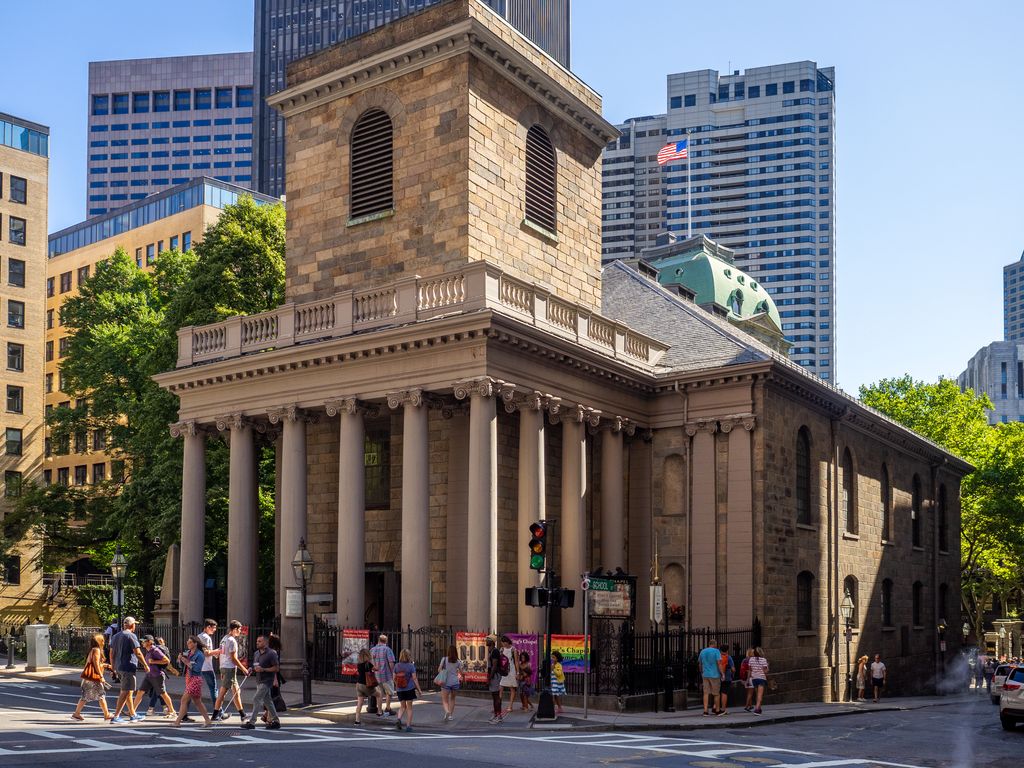Ballot-Stuffing at the Boston Town Meeting
Last month Jake Sconyers devoted an episode of his HUB History podcast to the long history of King’s Chapel, from Gov. Edmund Andros’s seizure of some of the land Boston had set aside for its first burying-ground to a recent fire in a Nova Scotia church built from the timber left over when the current stone chapel rose around it.
This podcast is primarily a story about real estate and architecture, not theology. There could be another whole narrative on how King’s Chapel was philosophically “rebuilt” as one of the town’s first Unitarian congregations soon after the Revolution while still maintaining its upper-class status.
In 1748 the King’s Chapel leadership wanted to build a larger church and proposed a deal: If Boston would grant it more land on School Street, the congregation would pay for a new South Latin School.
This required a vote at town meeting. One name popped out for me in the story of how that vote proceeded. Here’s a quotation from the official town records, as transcribed for the Colonial Society of Massachusetts:
It’s more surprising that after officials detected Pigeon casting multiple votes in 1748, his standing in town remained high. He married a woman from a wealthy Huguenot family in 1752. Two years later, he began to advertise his mercantile business regularly. He became a warden of Christ Church, the Anglican church in the North End. Later he opened an insurance office.
In the 1760s Pigeon was wealthy enough to retire to a country estate in Newton. He became active in the Patriot movement, serving on the Provincial Congress’s committee of safety in early 1775. He was even the Massachusetts army’s first commissary general, though he left that post prematurely.
I can only think that the authorities accepted that Pigeon sincerely thought he could cast votes for other people not at the meeting. Written votes on questions like this land sale were rare, so the protocols might not have been clear.
This podcast is primarily a story about real estate and architecture, not theology. There could be another whole narrative on how King’s Chapel was philosophically “rebuilt” as one of the town’s first Unitarian congregations soon after the Revolution while still maintaining its upper-class status.
In 1748 the King’s Chapel leadership wanted to build a larger church and proposed a deal: If Boston would grant it more land on School Street, the congregation would pay for a new South Latin School.
This required a vote at town meeting. One name popped out for me in the story of how that vote proceeded. Here’s a quotation from the official town records, as transcribed for the Colonial Society of Massachusetts:
…thereupon the Inhabitants were directed to bring in their Votes in writing, & such of ’em as were accepting of said Draft of a Vote as prepared by the Committee & passing the same as the Vote of the Town in answer to said Petition were desired to write Yea and such as were not for accepting it to write Nay.John Pigeon (1725–1800) was at that point a young man, still in his early twenties, starting out in business. He was an Anglican, so it’s not surprising that he supported the church expansion.
And the Inhabitants proceeded to bring in their Votes, and when the Selectmen were receiving ’em at the Door of the Hall they observed one of the Inhabitants Vizt John Pigeon to put in about a dozen with the Word Yea wrote on all of ’em and being charged with so doing he acknowledg’d it & was thereupon ordered by the Moderator to pay a fine of Five Pounds for putting in more than one Vote according to Law, and the Moderator thereupon declared to the Inhabitants that they must withdraw and bring in their Votes again in Manner as before
It’s more surprising that after officials detected Pigeon casting multiple votes in 1748, his standing in town remained high. He married a woman from a wealthy Huguenot family in 1752. Two years later, he began to advertise his mercantile business regularly. He became a warden of Christ Church, the Anglican church in the North End. Later he opened an insurance office.
In the 1760s Pigeon was wealthy enough to retire to a country estate in Newton. He became active in the Patriot movement, serving on the Provincial Congress’s committee of safety in early 1775. He was even the Massachusetts army’s first commissary general, though he left that post prematurely.
I can only think that the authorities accepted that Pigeon sincerely thought he could cast votes for other people not at the meeting. Written votes on questions like this land sale were rare, so the protocols might not have been clear.


No comments:
Post a Comment